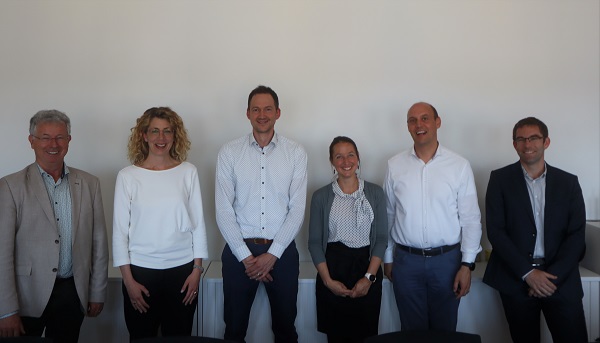 Group photo with Joëlle Welfring, Luxembourg’s Minister for the Environment, Climate and Sustainable Development (Left from Centre);
Credit: MECDD
Group photo with Joëlle Welfring, Luxembourg’s Minister for the Environment, Climate and Sustainable Development (Left from Centre);
Credit: MECDD
Luxembourg’s Minister for the Environment, Climate and Sustainable Development, Joëlle Welfring, the Environment Agency (Administration de l'environnement - AEV) and the SYVICOL association of Luxembourg cities and municipalities recently held a press conference about plans to transform recycling centres into resource centres.
This press conference presented the key new features of the draft Grand-Ducal regulation relating to the development and management of resource centres and other municipal infrastructures for separate collection. The aim is to align current Luxembourg regulations with circular economy and sustainable development objectives. It introduced new storage and waste management requirements, as well as directives for the management of objects collected with a view to reuse.
The main new changes are that each resource centre will have to set up a recovery and control point for objects intended for reuse, as well as setting up a space dedicated to second-hand items, accessible to citizens. All resource centres will also have to provide an information and awareness zone in order to raise citizens' awareness of prevention and reuse as a priority.
In addition, the regulation aims to provide information on the treatment, the rate of recycling and recovery of objects, to guarantee transparency as to their management.
In order to ensure proper application of the new features, the centres plan to provide additional training for the collection infrastructure staff.
This draft Grand-Ducal regulation was drawn up during four workshops in collaboration with the involved stakeholders, in particular the managers of the resource centres, the SuperDrecksKëscht recycling centre, the approved organisations representing the producers of products from the extended responsibility sectors and SYVICOL.
Until now, the regulation of recycling centres was covered by a 1993 Grand-Ducal regulation put in place to regularise the first container parks and establish a framework for future ones.
The “Null Offall Lëtzebuerg” (zero waste Luxembourg) strategy identifies the measures to be implemented for better resource management and addresses the main themes to be developed. According to the Ministry of the Environment, Climate and Sustainable Development, it encourages the transformation of recycling centres into resource centres, thus promoting the reuse of objects according to the hierarchy of waste, while providing for ways of reintroducing collected objects into economic circuits.
The ministry recalled that the 2012 amended law relating to waste stipulates that parties and events open to the public must be organised with the minimisation of waste production in mind. Thus, the use of single-use plastic products has been prohibited at public events since 1 January 2023. The Environment Agency has drawn up a guide for event organisers about this.
The ministry also emphasised the crucial role played by municipalities in the organisation of public festivals and events. Consequently, the Environment Agency and SYVICOL have agreed to collaborate to facilitate the implementation of this provision.
Moreover, a recently launched survey aims to get a comprehensive overview of existing reusable containers and washing facilities, and thus determine any additional needs and promote collaboration and sharing between municipalities.
Collection infrastructures in supermarkets have been optimised as part of a pilot project launched by the Luxembourg food and distribution federation (Fédération Luxembourgeoise de l’Alimentation et de la Distribution - FLAD), attached to Luxembourg Trade Confederation (Confédération luxembourgeoise du commerce – CLC) in collaboration with the public authorities. Three brands, located in Dudelange (Match), Strassen (Delhaize) and Roodt-Syre (Cactus), were in charge of the pilot phase, followed by a joint study conducted by Valorlux and the public authorities.
Further information is available on the website www.nulloffall.lu.








